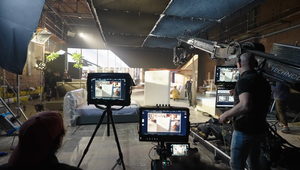
5 Sustainability Quick Wins for a Greener Long-Term Outlook

Looking back on last year, it would be fair to say that the climate emergency became real for many of us. No longer an issue taking place ‘over there’ that could, therefore, be overlooked, London experienced extreme and unrelenting heat for weeks over the summer. While the United Nations has set the world Net Zero carbon target for 2050, Tag - a global marketing production business - has set its goal for 2030, with the aim to bring a sustainable mindset to clients too.
“We have a clear aim and a comprehensive strategy already in place to help us get there,” says Emma Marsland, client managing director at Tag. Before taking a sustainable mindset and outlook to clients, Tag has been “getting its house in order, employing strategies, and establishing metrics to measure impact and hold us accountable,” according to Emma.
Working with clients on their sustainability goals, whether they come to Tag asking to start from the ground up or if they’re in need of expertise on how to turbocharge their current efforts, means having the ability to scale up Tag’s advisory capacity on a bespoke basis.
“The sustainability agenda continues to be a central point of conversation for many of our clients,” says Emma, adding, “even with the recession looming, I don’t foresee brands cutting budget on this, but they may need to make savings. We’ll be helping them to achieve the right balance, so they don’t have to choose between premium production solutions and their commitments to sustainability.”
With this in mind, Emma shares the five quick wins that a brand at any stage of their sustainability journey can implement for short-term improvements that will help to achieve long-term green goals down the line.
Measure where you are now and establish a baseline for progress on goals. Knowledge, it’s often said, is power; it’s vital to first get a realistic picture of your current carbon outputs. Finding out what the baseline is will allow you to track whether you’re improving fast enough or whether you’re improving at all. Measurable targets are not only easier to track, they’re also easier to implement with everyone having clarity on exactly what needs to be done across a particular timeframe.
Once you know the baseline, start managing it and identify opportunities to improve. The ‘discovery process’ of the previous step will make it obvious where the biggest, and fastest, improvements are needed; what’s already being done well, and what needs modifying. Typically, a combination of all three will present itself. Create a plan using your findings that outlines where the greatest attention is needed and how you’ll go about achieving the goals, which could mean dedicating more budget or bringing on alternative partners.
Mitigate, make the changes, and remeasure. For one of our clients, we carried out an extensive carbon footprint assessment on all materials purchased across EMEA in 2019/20 across their top suppliers, spanning thousands of orders and millions of components.
Key to the client realising their overall sustainability ambition was a significant change in:
● increasing recycled content
● removing PVC/problem plastics
● increasing recyclability
● increasing the use of certified materials
Creating a roadmap and a dashboard to quantify progress enabled Tag to compare a collection of material data against each of the target areas. We are now using trend analysis to identify specifically where we are making progress and to focus further on areas for improvement.
Keep using paper – for now. But make sure it’s certified by the Forest Stewardship Council (FSC). There are interesting developments in waste material being used for a paper replacement but currently these are costly and the viability as an alternative isn’t proven. Paper is also still the most widely recycled material of all.
We created a 100% biodegradable paper bag for one of our high-end clients without compromising the brand values and premium reputation. We spent several months of wear-testing and sample colour matching to print-match an unembossed shopping bag to an embossed paper swatch, as well as reconsidering the bag handles to comply with the brief. The resulting bags and handles are made from 100% uncoated FSC paper and are fully recyclable, passing all necessary weight tasks and sustainability criteria.
We also produced a sustainable drawstring bag with handles and a logo this client, ensuring that it met its green goals, that it was 100% biodegradable, and didn’t compromise on the lux finish. A pioneering thirteen-month journey involving 3 BS EN approved stages and the development of a completely new process in conjunction with our supplier lead us to a bag that is 100% natural, made of unbleached, undyed cotton and all printed with water-based inks.
Virtual shooting massively decreases the CO2 emissions of productions; the right production partner can advise how to best achieve this when brought on early. We included sustainable practices into every step of the production journey with one of our clients, resulting in a significant reduction in emissions year on year, specifically 87% overall reduction of CO2e per master.
We did this by benchmarking our production process and suppliers by measuring and reporting the carbon emissions of recent campaigns using AdGreen’s Carbon Calculator. We also ensured all account and production teams were AdGreen trained, before looking at streamlining the briefing process in three ways:
● Repurposing and reimagining any existing content
● Advising creative agencies on writing greener scripts from the outset
● Maximising upfront asset planning
Cutting waste was at the heart of the virtual shoots; from storyboarding and pre-visualisation to help avoid retakes, to removing air travel and onset catering.
Summarising, Emma concludes, “Following these steps allow us to leverage data and insights from previous campaigns and generate full end-to-end visibility of the production delivery process. Our evaluative technology delivers accurate readings, drives transparency, harmonises data and builds a pathway to help drive efficiency for future campaigns from everything from remote shoots and asset management to sourcing sustainably and end-of-life recycling.”
When it comes to sustainability, striving for perfection can be the enemy of good. What’s more important is that our industry continues to take steps towards greener practices wherever possible. Though it can feel like small changes won’t amount to positive results long-term, Tag’s practised and data-rooted approach shows that small really can be mighty.















